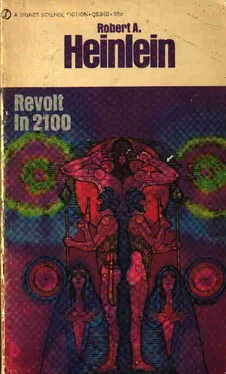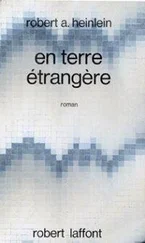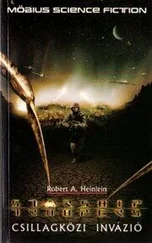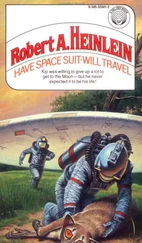Robert Heinlein - Revolt In 2100
Здесь есть возможность читать онлайн «Robert Heinlein - Revolt In 2100» весь текст электронной книги совершенно бесплатно (целиком полную версию без сокращений). В некоторых случаях можно слушать аудио, скачать через торрент в формате fb2 и присутствует краткое содержание. Жанр: Фантастика и фэнтези, на английском языке. Описание произведения, (предисловие) а так же отзывы посетителей доступны на портале библиотеки ЛибКат.
- Название:Revolt In 2100
- Автор:
- Жанр:
- Год:неизвестен
- ISBN:нет данных
- Рейтинг книги:3 / 5. Голосов: 1
-
Избранное:Добавить в избранное
- Отзывы:
-
Ваша оценка:
- 60
- 1
- 2
- 3
- 4
- 5
Revolt In 2100: краткое содержание, описание и аннотация
Предлагаем к чтению аннотацию, описание, краткое содержание или предисловие (зависит от того, что написал сам автор книги «Revolt In 2100»). Если вы не нашли необходимую информацию о книге — напишите в комментариях, мы постараемся отыскать её.
Revolt In 2100 — читать онлайн бесплатно полную книгу (весь текст) целиком
Ниже представлен текст книги, разбитый по страницам. Система сохранения места последней прочитанной страницы, позволяет с удобством читать онлайн бесплатно книгу «Revolt In 2100», без необходимости каждый раз заново искать на чём Вы остановились. Поставьте закладку, и сможете в любой момент перейти на страницу, на которой закончили чтение.
Интервал:
Закладка:
Robert A. Heinlein
Revolt In 2100
For Stan and Sophia Mullen
The Innocent Eye: An Introduction
ROBERT A. HEINLEIN is probably the best story-teller in the science-fiction field today. if I were backed into a corner and forced to tell why in one sentence, I'd say, "Heinlein's got a sense of proportion." Well, how does one get a sense of proportion? By experience, I think. And there is only one kind of experience that counts as necessary to a competent writer: experience of mankind. Literary and scientific techniques are very useful to a writer, but I don't think the study of them is necessary. They are intellectual concepts. Man is also an emotional animal. And a good story must be about man-not man after a lobotomy, but about the irrational part of him as well as the rational. Sentimentality is no substitute; it degrades man instead of treating him with the respect that, God knows, he deserves. Unfortunately, too many science-fiction stories might have been written by robots or spirits. Now Heinlein does something that is vitally necessary to good writing: he perceives people. He knows how they feel. He has felt that way himself. He has even bridged the difficult gap of realizing that people feel much the same way everywhere, allowing for constitutional differences. He has accepted membership in the human race. I don't think you can be a good writer unless you do that. I'm biased I know; I like good writing, and I have a great deal of respect for it. Good writing is well proportioned. Basically, it treats of man in his environment, and both of those elements must haw verisimilitude. That's where Heinlein's sense of proportion comes in. He's eclectic. He follows the principles but not the rules. His stories have verisimilitude because they are about people, and he uses other materials only insofar as they affect those people. And here is the precise point where his sense of proportion appears. The story-elements he uses, technological, sociological, psychological, are chosen according to their natural relation to the center of interest: man. These elements are symbolic of man's values. But it is man, realistically handled, who is the nucleus of each Heinlein story. If I had to pin a label on Heinlein, I'd call him a romantic humanist.\ He deals with the relation of man to science. His attitude to\science is to my mind a rational one: neither idolatry nor panic, and this may be because he knows something of the social sciences, the link between man and machine. Man as a dynamic part of a dynamic society is a concept rarely treated in science-fiction. Large faceless masses surge in the background, in an outrageously homogeneous fashion, and against this scene unqualified protagonists perform incredible and unmotivated deeds, through logical processes slightly beyond the utmost bound of human thought. No society has ever been homogeneous, even in Sparta. There will always be Coventries. Heinlein knows this, and is perhaps the only science-fiction writer who has seen the real purpose of creating a temporal frame for stories which by definition deal with the movement of man and society through time. The use of this method of dynamic continuity is one of Heinlein's mafor contributions to the field of science-fiction. Imaginative literature ideally reflects and interprets reality. Future "realities" have often been handled by means of what is actually symbolism. That is, of course, one way to do it. It is not the only way; an integrated mirror of a future reality which can be accepted as three-dimensional rather than as a background of "flats" may be aиhieved by Heinlein's method of dynamic continuity. Once that is achieved, the writer is free to tell a story about the values of men and women which is significant to the men and women who read the story. Since the future societies which Heinlein postulates are workable societies, he can concentrate upon the important problems of human beings in relation to their culture. Those problems may affect the society, but their importance rests in how they affect the individual. And Heinlein understands that the personality is as complex as the society. The same man who wrote Coventry wrote They. All this, however, does not entirely explain why Heinlein is such an excellent story-teller. C. L. Moore calls Heinlein's work the result of "the innocent eye and the sophisticated mind," which seems to me an accurate analysis. The term, "a sense of wonder," has been too often profaned for me to profane it, but I will go so far as to say that nobody who knows Heinlein could call him blasй. Since I have known him, his attitude has always been, "If this goes on-." And from that, it's only a step to "Once upon a time-."
HENRY KUTTNER Los Angeles, California
If This Goes On...
1
It was cold on the rampart. I slapped my numbed hands together, then stopped hastily for fear of disturbing the Prophet. My post that night was just outside his personal apartments-a post that I had won by taking more than usual care to be neat and smart at guard mount...but I had no wish to call attention to myself now. I was young then and not too bright-a legate fresh out of West Point, and a guardsman in the Angels of the Lord, the personal guard of the Prophet Incarnate. At birth my mother had consecrated me to the Church and at eighteen my Uncle Absolom, a senior lay censor, had prayed an appointment to the Military Academy for me from the Council of Elders. West Point had suited me. Oh, I had joined in the usual griping among classmates, the almost ritualistic complaining common to all military life, but truthfully I enjoyed the monastic routine-up at five, two hours of prayers and meditation, then classes and lectures in the endless subjects of a military education, strategy and tactics, theology, mob psychology, basic miracles. In. the afternoons we practiced with vortex guns and blasters, drilled with tanks, and hardened our bodies with exercise. I did not stand very high on graduation and had not really expected to be assigned to the Angels of the Lord, even though I had put in for it. But I had always gotten top marks in piety and stood well enough in most of the practical subjects; I was chosen. It made me almost sinfully proud-the holiest regiment of the Prophet's hosts, even the privates of which were commissioned officers and whose Colonel-in-Chief was the Prophet's Sword Triumphant, marshal of all the hosts. The day I was invested in the shining buckler and spear worn only by the Angels I vowed to petition to study for the priesthood as soon as promotion to captain made me eligible. But this night, months later, though my buckler was still shining bright, there was a spot of tarnish in my heart. Somehow, life at New Jerusalem was not as I had imagined it while at West Point. The Palace and Temple were shot through with intrigue and politics; priests and deacons, ministers of state, and Palace functionaries all seemed engaged in a scramble for power and favor at the hand of the Prophet. Even the officers of my own corps seemed corrupted by it. Our proud motto 'Non Sihi, Sed Dei' now had a wry flavor in my mouth. Not that I was without sin myself. While I had not joined in the struggle for worldly preference, I had done something which I knew in my heart to be worse: 1 had looked with longing on a consecrated female. Please understand me better than I understood myself. I was a grown man in body, an infant in experience. My own mother was the only woman I had ever known well. As a kid in junior seminary before going to the Point I was almost afraid of girls; my interests were divided between my lessons, my mother, and our parish's troop of Cherubim, in which I was a patrol leader and an assiduous winner of merit badges in everything from woodcraft to memorizing scripture. If there had been a merit badge to be won in the subject of girls-but of course there was not.
Читать дальшеИнтервал:
Закладка:
Похожие книги на «Revolt In 2100»
Представляем Вашему вниманию похожие книги на «Revolt In 2100» списком для выбора. Мы отобрали схожую по названию и смыслу литературу в надежде предоставить читателям больше вариантов отыскать новые, интересные, ещё непрочитанные произведения.
Обсуждение, отзывы о книге «Revolt In 2100» и просто собственные мнения читателей. Оставьте ваши комментарии, напишите, что Вы думаете о произведении, его смысле или главных героях. Укажите что конкретно понравилось, а что нет, и почему Вы так считаете.











